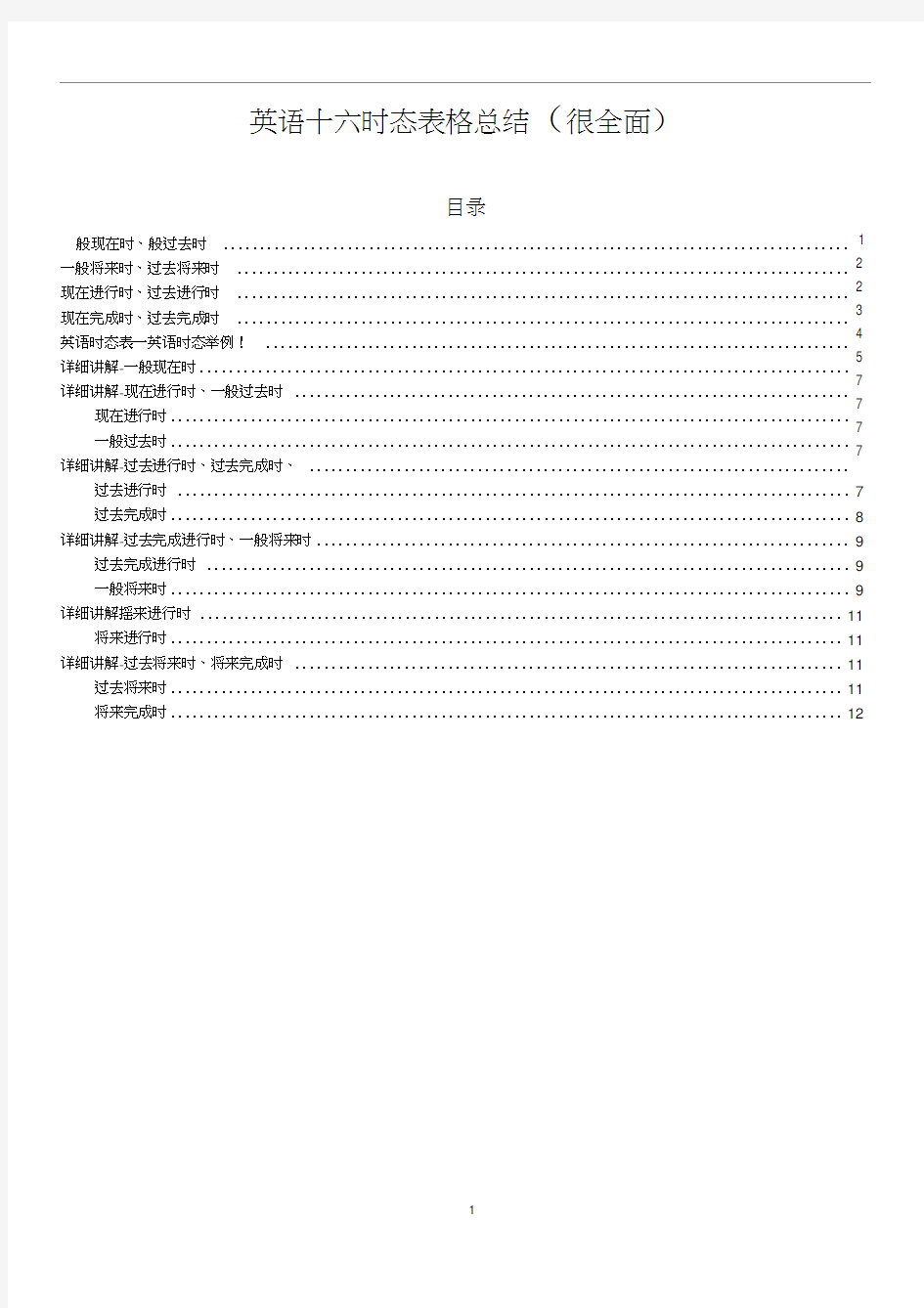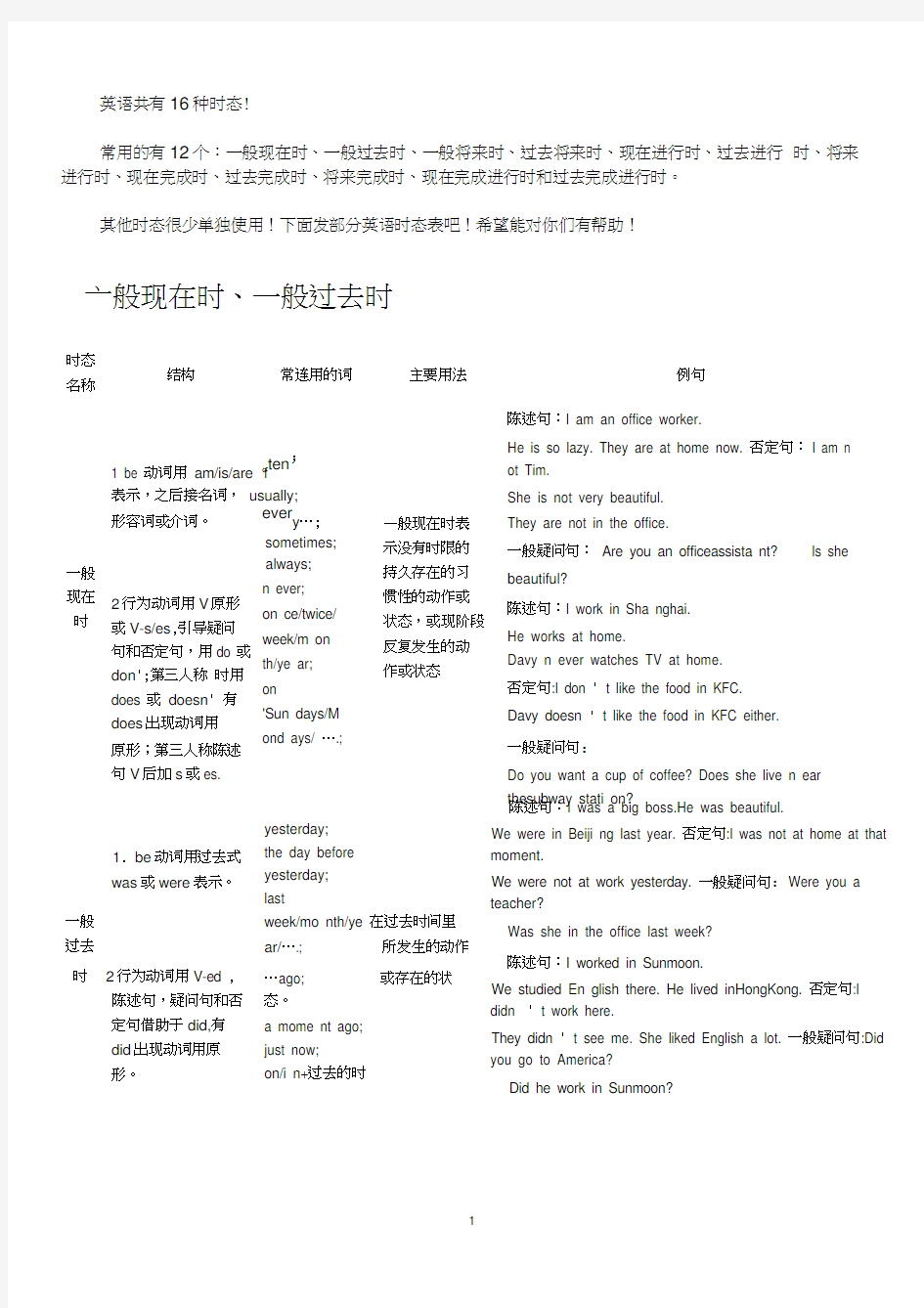

英语十六时态表格总结(很全面)
目录
般现在时、般过去时 ...................................................................................... 一般将来时、过去将来时 .................................................................................... 现在进行时、过去进行时 ....................................................................................
现在完成时、过去完成时 ....................................................................................
英语时态表一英语时态举例! ................................................................................
详细讲解-一般现在时 .........................................................................................
详细讲解-现在进行时、一般过去时 ............................................................................
现在进行时 .............................................................................................
一般过去时 .............................................................................................
详细讲解-过去进行时、过去完成时、 ..........................................................................
过去进行时 ............................................................................................ 7 过去完成时 ............................................................................................. 8 详细讲解-过去完成进行时、一般将来时 . (9)
过去完成进行时 ........................................................................................ 9 一般将来时 ............................................................................................. 9 详细讲解揺来进行时 . (11)
将来进行时 ............................................................................................ 11 详细讲解-过去将来时、将来完成时 (11)
过去将来时 ............................................................................................ 11 将来完成时 .. (12)
1
2 2
3
4
5
7
7
7
7
英语共有16种时态!
常用的有12个:一般现在时、一般过去时、一般将来时、过去将来时、现在进行时、过去进行 时、将来进行时、现在完成时、过去完成时、将来完成时、现在完成进行时和过去完成进行时。
其他时态很少单独使用!下面发部分英语时态表吧!希望能对你们有帮助!
亠般现在时、一般过去时
陈述句:I was a big boss.He was beautiful.
We were in Beiji ng last year. 否定句:I was not at home at that moment.
We were not at work yesterday. 一般疑问句:Were you a teacher?
Was she in the office last week? 陈述句:I worked in Sunmoon.
We studied En glish there. He lived inHongKong. 否定句:I didn ' t work here.
They didn ' t see me. She liked English a lot. 一般疑问句:Did you go to America?
Did he work in Sunmoon?
时态 名称
结构
常连用的词
主要用法
例句
1 be 动词用 am/is/are °f ten ;
表示,之后接名词, usually;
形容词或介词。
ever
y …; sometimes; 一般
现在 时 always;
2行为动词用V 原形
或V-s/es ,引导疑问 句和否定句,用do 或
don ';第三人称 时用
does 或 doesn ' 有
does 出现动词用
原形;第三人称陈述
n ever;
on ce/twice/
week/m on
th/ye ar;
on
'Sun days/M
ond ays/ ….;
—般现在时表 示没有时限的 持久存在的习 惯性的动作或 状态,或现阶段 反复发生的动 作或状态
句V 后加s 或es.
陈述句:I am an office worker.
He is so lazy. They are at home now. 否定句: I am n ot Tim.
She is not very beautiful. They are not in the office.
一般疑问句: Are you an officeassista nt? Is she
beautiful?
陈述句:I work in Sha nghai. He works at home.
Davy n ever watches TV at home. 否定句:I don ' t like the food in KFC. Davy doesn ' t like the food in KFC either. 一般疑问句:
Do you want a cup of coffee? Does she live n ear thesubway stati on?
1. be 动词用过去式 was 或were 表示。
一般 过去
时 2行为动词用V-ed ,
陈述句,疑问句和否 定句借助于did,有 did 出现动词用原 形。
yesterday;
the day before yesterday; last
week/mo nth/ye 在过去时间里 ar/….; 所发生的动作 …ago;
或存在的状
态。
a mome nt ago; just now; on/i n+过去的时
亠般将来时、过去将来时
时态
名称
结构常连用的词主要用法例句
陈述句:1 will fly to KongKong tomorrow.
tomorrow, He will go with us.
the day after We will arrive in Shan ghai next week.
tomorrow; 否定句:I will never believe you again.
soon; He will not come toni ght.
一般1任何人称+will+ V n ext We will not buy a car n ext year.
将来原形?week/m on th/ye 即将发生动作一般疑冋句:Will you go there by train?
1 'J 时
ar/...; 或状态。Will he come tomorrow?
the Will they live a five-star hotel?
2 is/am/are+go ing
week/m on th/ye
ar/... after n ext;
on/in +将来的
时间;
in+—段时间;.
陈述句:1 ' m gog to go to Kongkong by air. 否定句:We
are not going to buy a house here.
to+V原形,表示计划
打算做什么事情。
一般疑冋句:Are they going to change their jobs? 特殊疑
问句:How are you going to tell him?
陈述句:I was going to buy a computer.
过去将来was/were going to +V
原形
多用在宾语从句
中
在过去将会发生
的动作。
They told me that they were not going to goabroad. 否定
句:I was not going to buy a computer.
时任何人称+would +V He said he would come in in Shan ghai.
原形I said I would buy you a car one day. 现在进行时、过去进行时
时态
名称
结构常连用的词主要用法例句
现在
进行时is/am/are+V-i ng
now
;表示现在(指
at present;
说话人说话时)
at the moment;
正在发生的事
Look!(放在句首); 情
Listen!(放在句首);
陈述句:1 ' m waiting for my boy friend.
He is doing the housework at home now.
We are enjoying ourselves. 否定句:He is not playing toys.
一般疑冋句:Are you having dinner at home?
Is Tim cook ing in the kitche n? 特殊疑问句:What are you
doing now?
Where are they havi ng a meal?
过去
进行时was/were+V-i ng
at that time; 过去一段时间
at this time
正在发生的动
yesterday; 作。
at+时间点
陈述句:1 was doing my homework at that time.
We were havi ng a party while he was sleep ing.
否定句:He was not sleep ing at 11 o ' clock last night
一般疑冋句:Were you watching TV at that time?
+yesterday/last ni ght; at that mome nt; 特殊疑问句:What were you doing at that moment?
现在完成时、过去完成时
时态名称
现在完成时
过去完成时
结构常连用的词主要用法例句
have/has+ p.p
(过去分
词)
特别注意:
had + p.p
分词)
(过
去
already ;just ;
before;
yet(否定句
中);ever ;
never;
once/twice/ …
for+ 一段时间;
since +时间点;
since+ 一段时间
+ago;
by+现在时间;
so far; up to now;
till now; until now;
recen tly/lately;
duri ng/over/ in
thepast/last
用来表示之前
已发生或完成
的动作或状态,
其结果的确和
现在有联系动
作或状态发生
在过去但它的
影响现在还存
在;也可表示
持续到现在的
动作或状态。简
单的说,就是动
作已经发生对
现在造成明显
的影响。
陈述句:I have already told Davy. Davy has known
thismatter.
He has lived here for n early 10 years. 否定句:I haven '
t finished my homework..
Tim hasn ' t come yet.
We haven' t heard any n ews about him 一般疑问
句:Has he worked here since he came here?
特殊疑问句:How long have you worked in thiscompa
ny?
1. have/has always been+ 名词/形容词/介词:总是或一直是什么样子。。。
He has always bee n a good father. I have always bee n busy.
They have always bee n in America.
2. have/has gone to: 去了。。。
He has gone to Beiji ng.
They have gone to the cin ema.
过去的过去:
by+过去的时间;
表“过去某动作或
时间以前”的时间
状语。
动作发生在过
去的过去。
He left the office after he had called Davy. 否定
句:She hadn ' t had dinner before she went out.
一般疑问句:Had she learnt English before she
movedhere?
特殊疑问句:how many English w rds had he lear
nt by thee nd of last year?
英语时态表一英语时态举例!
Simple Prese nt 一般现在时
Simple Past
一般过去时
Simple Future
一般将来时
句子结构:主语+will+V.
If you are hav ing problems, I will
句子结构:主语+V
句子结构:主语+V-ed help you study English.
I study En glish everyday. Two years ago, I studied English in America. 如果你在学习英语当中,遇到问题,我将
帮助你.
我每天都学习英语?两年前我在美国学英语句子结构:主语+be going to+V
n 'J ,少Q/匚匚木;1=^1 vC A口-
I ' going to study English next year.
我明年将开始学习英语.
Prese nt Continu ous Past Con ti nu ous Future Continu ous 现在进行时过去进行时将来进行时
句子结构:主语+will be+doing
句子结构:主语+was/were+doing
I will be studying English when you arrive
toni ght.
句子结构:主语+be+doing
I was study ing En glish when
明晚你来的时候,我会正在学习英语.
I am studying English now.
you called yeaterday.
句子结构:主语+be going to+be+doing 我正在学习英语.
你昨天给我打电话的时候,我正在学习英语. I ' going to be studying English when
you arrive toni ght.
同上.
Prese nt Perfect Past Perfect Future Perfect 现在完成时过去完成时将来完成时
句子结构:主语+had done 句子结构:主语+will+have done
句子结构:主语+have/has done
详细讲解-一般现在时
通常以动词原形表示。主语为第三人称单数时,用现单三形式 动词be 和have (表示 拥有”各人称的单数形式为:
I have studied En glish in several
differe nt coun tries.
I had studied a little En glish before I
moved to the U.S.
在一些国家,我已经学习了英语
在我搬去美国之前,我已经学习了一
点英语.
I will have studied every tense by the
time I finish this course.
在我完成这个课程的时候,我已经能完
成英语时态的学习了 . 句子结构 :主语 +be going to+have done
I m going to have studied every tense by
the time I finish this course.
同上.
Prese nt Perfect Con ti nu ous
现在完成进行时 Past Perfect Con ti nu ous
过去完成进行时 Future Perfect Con ti nu ous
将来完成进行时
句子结构:主语+have/has been
doi ng
I have bee n study ing En glish for
ten years.
句子结构:主语+had been doing
I had bee n study ing En glish for ten
years before I moved to the U.S.
在我搬去美国之前,我已经学习了十
年的英语了 .
句子结构:主语 +will have been doing
I will have been studying English for over three hours by the time you
arrive.
明晚你来的时候,我已经学习英语3个
小时了 .
句子结构:主语 +be going to have been
doi ng
I ' going to have beenstudying English for over three hours by the time you
arrive 同上.
般现在时的否定式、疑冋式和简单回答形式如下:
动词的否定疑问式和简单回答:
动词have(表示拥有”的否定疑问式和简单回答:
注意:作为行为动词则只能按照行为动词的规则变化。
详细讲解-现在进行时、一般过去时
现在进行时
由助动词be +现在分词构成。其中be有人称和数的变化,有三种形式:第一人称单数用am,第三